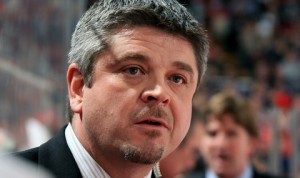
San Jose won the President’s Trophy as the best regular season team because of their balance. They are fifth in penalty killing and seventh in scoring, plus top three in goals against, power play, shots on goal, shots against, and face-offs.
Meanwhile, Anaheim is not in the top three in any of these stats and top five only in power play. They are in the top half in only two more categories: shots (12th) and goals (14th).
So why are many people picking the Ducks? There are a couple legitimate reasons: the Sharks are playing badly while the Ducks are playing well down the stretch. Also, the Sharks have bowed out in the second round three seasons in a row, while the Ducks have gone beyond that round twice in that span, including winning it all in 2007.
Let’s address the first point. Contrary to popular belief, the hottest team going into the playoffs rarely wins the Cup, or the Sharks would be defending champions. (Check back: winners in this decade were almost all over .500 but under .750 in the final ten games.) Often, these teams have peaked too early, so when opponents find a game plan to counter it, the hot team is in too big a hole by the time they adapt.
The Ducks are getting Francois Beauchemin back on their blueline, and that will re-establish them as a premiere unit. They have experience, star talent, and are mentally and physically tough. The latter can also punish and derail a team from their game, and that has happened to the Sharks in the playoffs before.
This brings me to my second point: as I have said before, this is not the 2007 Sharks. And worse for the Ducks is that their edgy (read: dirty) style also leads to penalties. The Ducks have the second-most PIM in the league (although fights—they led the league at one a game—that tend not to happen in the playoffs contributed to that), and they are too bad at killing them (23rd in the NHL) to win while putting the Sharks, who are too good on the power play, on the man advantage.
Plus, the Sharks have been getting healthy in April and are likely to be getting Ken Huskins and Torrey Mitchell back, skaters who have not played for them all season. That is like an end of the season trade, and both are great penalty killers. Not that the Sharks need that often: San Jose has fewer PIM than all but four other playoff teams, and only one in the West (Detroit).
Here is how the teams stack up by unit:
• Blue line: statistically, San Jose’s defence is in the NHL’s top three in shots, points, goals, and power play points, but with Beauchemin returning, the reality is the Ducks have a slight advantage…it’s just that their system is not conducive to scoring.
• Forwards: this is not even close. San Jose’s first and second lines comprise the league’s elite two-line punch; Anaheim only has one elite line. With the Sharks getting Travis Moen from their foes, their already noticeable advantage on the checking lines has increased, as well.
• Goaltending: the Sharks have a better GAA and a better team save percentage, and if the Ducks are forced to go with Jonas Hiller over Jean Sebastien Giguere, who looks like he has not fully recovered from off-season hip surgery, they will have more experience, too.
Add it up and San Jose has every statistical advantage, home ice advantage, and the advantage in two of three units, including one that is substantial. They also won four of six regular season match-ups (two of three at home and on the road) and are built to exploit the Ducks’ lack of discipline.
Anaheim has more experience and is playing better. That is nowhere near a balance, but I am going to give the Ducks two wins because the rivalry always favours the underdog. San Jose in six.